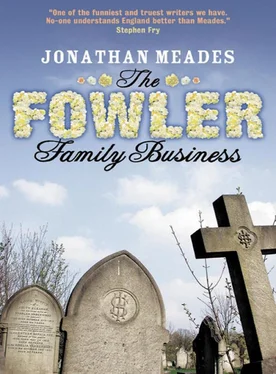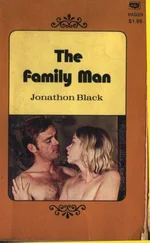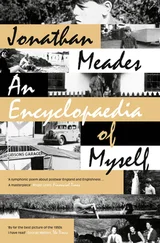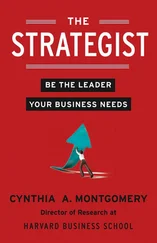No mention there of Curly who had come along only five years later. Curly considered himself an afterthought. His father, besotted by Stanley who was made in his image, loved Curly when he remembered to, and when he was reminded to by his wife who clawed the smoky air as though punch drunk when she tried to beat him for his hopelessly disguised infidelities.
She wasn’t punch drunk, Mr Croney didn’t hit her, she was merely drunk, gin and sweet vermouth, so drunk that she left meat in the oven to turn to charcoal, so drunk that she lost the hang of clock time and would wake Stanley to go to school at 3 a.m. and run a bath for his little brother as soon as she had packed him out the door into the freezing fog and obfuscated sodium light, so drunk that Mr Croney grew neglectful of his excuses. He saw the error of that particular way when he returned one night to find her sober because there was no more credit at the off-licence. Her fury when in that state was focused, hurtful, shaming; he felt he had no right to be alive. So first thing in the morning he hurried to the off-licence, paid her debt and advanced the shop £30, in cash, with a wink. An investment, he said to himself, an investment – and alcoholic oblivion is a blessing to her, it helps her to forget the terrible loss of her baby and should thus be encouraged. No amount of alcohol could inhibit her breakfast screams at yet another boiled wasp preserved in a jar of plum jam.
The Fowlers’ old-fashioned house was Curly’s refuge from home, his home from home. He first came by one frosty morning six weeks after his brother’s funeral (directed by Fowler & Son) having shyly phoned to ask if he could sort through Stanley’s electric model train set which Stanley had pooled with Henry’s because the Fowler house was big enough to accommodate a permanent layout in an unheated semi-attic bedroom. The 00 ctagon of track matted with dust rested on a trestle-table along with a streaky grey aluminium control box, carriages with greasy celluloid windows, an A-4 Gresley Pacific, a Merchant Navy class locomotive, a shunter with a broken wheel, an EDL17 0–6–2 still in its royal-blue-and-white pinstriped box because by the time Stanley had been given it he was past playing with model trains. Mrs Fowler suspected that Curly, too, was past that age. She had a feeling in her waters that Curly was, though he might not know it, in search of something other than metal Dubio and plastic Tri-ang. Mrs Fowler dusted around the track, excusing her negligence, watching Curly as he picked through toys he was interested in only as souvenirs of his brother. He picked up a cream metal footbridge, fondled it with puzzled familiarity, held it out to show her.
‘That’s the bridge. It’s just like the bridge,’ he said before he wept.
She comforted him. She made him hot chocolate. She made him drop scones with honey. She held his reticent hands and hugged him. When Henry came in from work experience (at Fowler & Son) she told her son that she and Curly had just been having a little talk. Henry was startled, and it showed. They sat, the three of them, at the breakfast-room table where he had so often sat with Stanley. Mrs Fowler made a gesture to Henry, the sort of gesture a different mother might have made to her son in the presence of a girl, a nodding smile of connivance which implied more than approval, which implied a duty to go for it. So Henry suggested to Curly that they have a kick-about on the lawn. It was frosty all that day, and the ground was slippy. Neither the sixteen-year-old nor the eleven-year-old could control the old sodden ball on the crunchy grass but they played happily, in earnest, straining to tackle, diving to save, deflecting the ball off Her Majesty’s trunk, getting up a sweat and blowing white fire from their throats. When the dark came down on the garden they went inside for a tea of anchovy toast and lemon barley water.
That evening’s panel on Juke Box Jury was Jack Good, Johnny Tillotson, Helen Shapiro and, making his only appearance on the show, Bobby Camino. Curly was also a fan, and hung on every word he had to say about the Dovells’ ‘Bristol Stomp’ before he was shut out by Mr Fowler’s chortling joke that ‘They’re more like the Bristol Zoo than the Bristol Stomp. That’s hungry animals crying out to their keepers, that’s what that is.’ And Henry and Curly longed for the day when they would agree with him, without equivocation, without even a frisson of excitement at the wailing which defied propriety. That was the teatime when the Fowlers taught Curly canasta.
Then it was Henry and Curly, Curly and Henry. Curly wasn’t a card, nor was Henry. Curly wasn’t a caution the way his brother had been, he was as cautious as Henry. It was always Henry and Curly, in that order, according to age and experience. Henry took the boy they had somehow overlooked off his parents’ hands, their cack-hands when it came to their younger one, now, terribly, their only one. They were happy, Mr and Mrs Croney, to let their boy hang around with their lost one’s friend. It never occurred to them, nor should it have, that there was anything mucky (a well-used word of Mr Fowler’s) about this friendship. They were right. Henry and Curly never even talked of girls or sex. Stanley’s death had relieved Henry of the pressure to compete in an adolescent contest which he’d not wanted to partake in. He was no longer obliged to boast of conquests which he hadn’t made, hadn’t the nerve to make, lacked the will to make. Had Stanley really believed him when he said he’d fingered Cathy Pelly, when he said that Sally Sanger had unzipped his Terylene trousers? He had only been echoing Stanley after all. Stanley had never expressed incredulity, had never questioned his seductive prowess. So he had believed him? Not on your life.
Henry was happy that the onerous obligations of mucky behaviour had been lifted. He was a loner in most regards – he had few friends other than Stanley and now Curly – so why not be a loner in sex too? It was a private matter, sex, not to be shared, not to be witnessed save by the morosely mocking eyes of the monochrome girls in the discreetly proportioned pocket magazines which he stole from the near-blind Mr Gough, the newsagent whose devotion to such magazines had brought him to that state, had brought him out in brown stains on his skin, had done for his hearing too. Henry could open the door to the shop without causing the sprung bell to ring, without disturbing Mr Gough, frotting and coughing in his cell of tobacco and flesh at the far end of the shop.
Henry knew it was wrong to steal these profane images. But stealing was appropriate because it augmented his shame, it doubled his sin, it increased the guilt attached to his betrayal of his parents with meaty tarts, it made sex conditional on crime even if that crime was venial and the sex was the glueing together of silky pages that were potent beyond their size. These thefts were, so far as he could recall, the only crimes he had ever committed. Try as he might he couldn’t remember anything half as bad. He was out of step with his contemporaries’ judicious delinquency. He saw the good sense in not jaywalking. He was contemptuous of the kudos attached to getting (a girl) into trouble. And whilst other adolescents were swept along by the glandular revolution within their bodies and allowed it to determine their mores, Henry resisted the hormonal call. At the age of sixteen he was already the victim of a longing for the certainties and stasis of his comfy past.
Stanley had persuaded him to read books by writers with beards. He preferred tales of wartime aircrews’ escapes after being shot down over occupied France. He enjoyed the pitchfork’s tynes in a haystack, the shy peasant girls, the radio transmitters disguised as sewing machines, the mortal sacrifices, the Gestapo beating testicles with rubber truncheons. He admired the looks of the men shown in the jacket paintings: tough yet kind, decent and modest, with regular brave blond acne-free features. They were adventurers with right on their side, heroes whose lives were uncontaminated by equivocation and impure thoughts. Henry lent Curly such memoirs as T.D.G. Teare’s Evader , Bruce Marshall’s White Rabbit and D. Baber’s Where Eagles Gather. Curly had only just finished Fugitives by Night when Mrs Croney asked Henry to take the boy for a dental check-up.
Читать дальше












